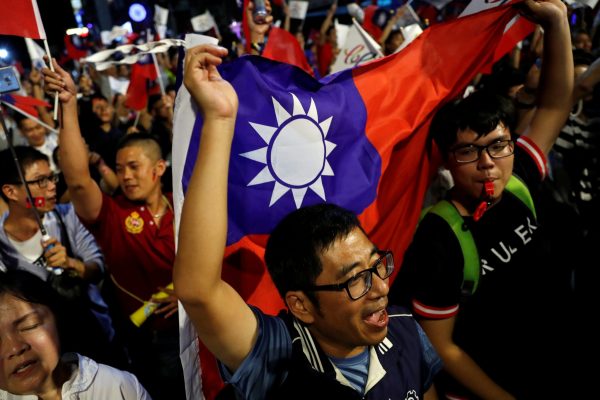Meanwhile, US–Taiwan relations are advancing and Taipei is strengthening its regional ties.
President Tsai is successfully pushing forward reforms to restructure Taiwan’s economy in response to an ageing society and increasing economic and technological competition with China. Taiwan had its best economic growth rate in years in the first quarter of 2018, reaching 3 per cent.
Still, Taiwanese civil society remains dissatisfied. In March, Tsai’s DPP introduced amendments to the Labor Standards Act with the aim to make seven Taiwanese industries more competitive against their Chinese counterparts. The amendments angered Taiwanese unions by reducing mandatory days off and increasing allowable overtime. Although President Tsai also raised the monthly minimum wage by 10 per cent and public servant pay by 3 per cent in May, the government was still met with protests for higher wages.
In June, the DPP legislated unpopular but much needed pension reform, reducing pensions to military veterans, civil servants and public school teachers. Although this sparked violent protests from military veterans, the reform had already been considered by Tsai’s predecessors Chen Shui-bian and Ma Ying-jeou. It was deemed necessary to avert ‘pension bankruptcy’ amid a rapidly ageing demographic.
Tsai’s proposed constitutional change to legislate LGBTQI marriage equality was viewed as too slow by Taiwanese youth and activists on the one hand, but too controversial by conservatives on the other. In a similarly polarising move, the Tsai government allowed the restarting of nuclear reactors in response to a 2017 blackout that affected northern Taiwan. The move angered environmentalists but was supported by Taiwanese industry, which argued that a long-term energy policy that didn’t rely on Taiwanese nuclear power would be disruptive to the sensitive manufacturing of goods such as super-conductors.
Consequently, the DPP suffered major losses in the November local elections, losing crucial mayoral races in DPP strongholds such as Kaohsiung and Taichung and leading President Tsai to resign as DPP chairperson. Despite protests against ‘bullying’ from Beijing and calls for a referendum on independence just one month before elections, this outcome is a reflection of local dissatisfaction with the government’s handling of domestic issues rather than a broad rejection of the DPP’s China policy.
A consecutive rotation of power between rival political parties, a vocal opposition and a vibrant civil society are also reflective of Taiwan’s stable democratic consolidation. Just two years ago, President Tsai won the general election in a landslide, with overwhelming popular votes in both the presidential and legislative elections in 2016. And four years ago, the then-ruling Kuomintang also endured a significant defeat in the 2014 ‘9 in 1’ elections. Such outcomes demonstrate the long-term assertion of Taiwan’s distinct political system in comparison to the increasingly autocratic Chinese Communist Party (CCP)-led mainland China.
That said, Tsai’s effort to delineate Taiwanese identity from mainland China while preserving the fragile cross-Strait balance is proving costly. Beijing is escalating influence operations and diplomatic pressure on Taiwan. The loss of Taiwan’s diplomatic allies continues, with Taiwanese sovereignty losing recognition in Burkina Faso, the Dominican Republic and El Salvador in 2018. Ceding to demands from China’s aviation regulator, Taiwan also lost recognition as an independent country on 18 airline websites, including Air Canada and Qantas.
Such moves from Beijing come at a time of intensifying China–US strategic competition. Accordingly, US–Taiwan defence ties are increasing given Taiwan’s geostrategic significance for the East and South China Seas. In May, the White House signed the Taiwan Travel Act to ‘encourage visits between US and Taiwanese officials at all levels’. In September, the Trump administration approved a US$330 million arms sale to Taiwan to provide logistics and program support for Taiwanese military aircraft. The deal came less than a year after the White House approved a US$1.4 billon sale to upgrade programs such as electronic warfare systems and air-to-ground missiles.
Tsai’s changing strategy of appealing to major powers such as the United States, Japan and India instead of pursuing chequebook diplomacy with smaller developing countries is beginning to pay dividends. Her signature New Southbound Policy is also successfully expanding Taiwan’s trade, investment and tourism ties with Southeast Asia.
Taiwan is asserting its ideological and political distinctness from mainland China. Despite increasing diplomatic pressure from the CCP, long-term trends remain in favour of Taiwan maintaining its de facto independence.
Sheryn Lee is a Lecturer at the Department of Security Studies and Criminology, Macquarie University.
This article is part of an EAF special feature series on 2018 in review and the year ahead.


“‘A consecutive rotation of power between rival political parties, a vocal opposition and a vibrant civil society are also reflective of Taiwan’s stable democratic consolidation.””
This was a disaster for democratic politics in Taiwan. The resurgence of an authoritarian, gangster-ridden party that hates Taiwan and its democracy and wants to annex the island to China is not a sign of positive political direction.
The pensions were an issue, but the problems in Taichung and Kaohsiung stemmed from poor political choices by the DPP and the resurgence of local gangster/faction politics in the KMT. The win was orchestrated by the Taiwanese faction of the KMT. The DPP administrations in the two big cities were poor and that is why they lost. Running the hapless glad hander Lin Chia-long in Taichung, married to Chimei money and completely out of touch with that working class city, was stupid. He failed utterly to impress the locals.
Meanwhile in Kaohsiung the old dirty faction networks were reactivated for this one.
This is not democratic progress. This is a regression to 90s politics. Its very bad for Taiwan.
Finally, as always the DPP victories in traditional blue areas up north, due entirely to the excellent administrators there who are in touch with the local population, show that fundamentally the party lost because of its political choices at the local level, coupled with anger over pensions.
Michael Turton